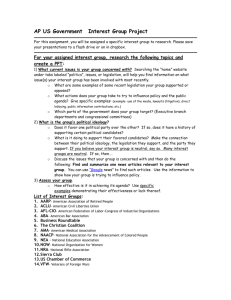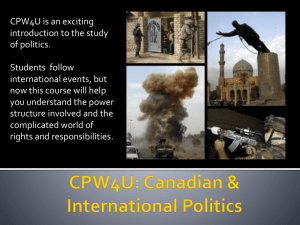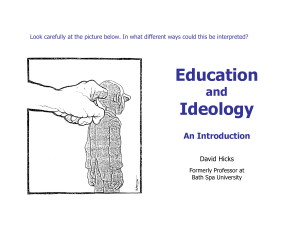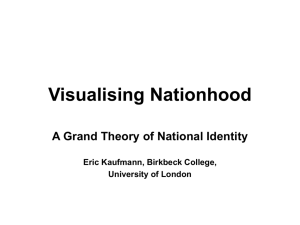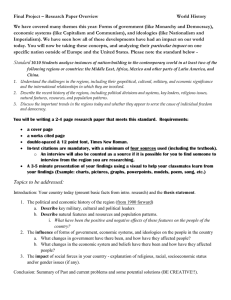Chapter 1: Ideology and Ideologies What is
advertisement
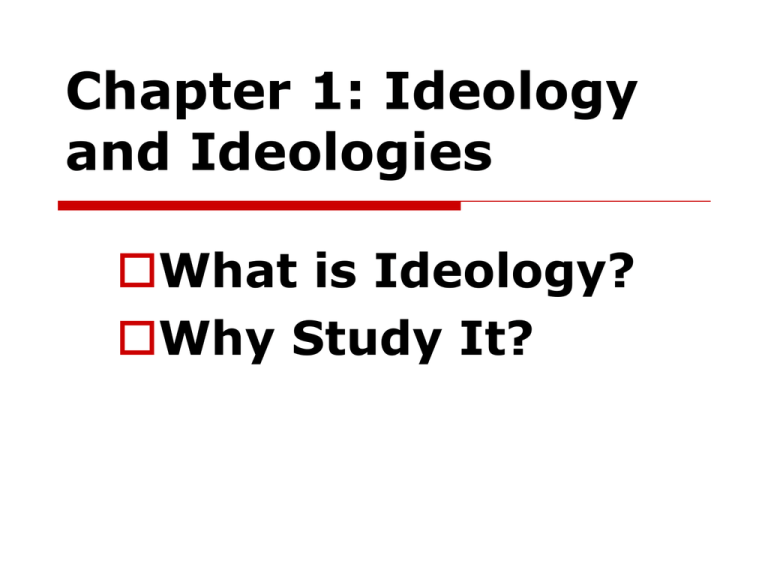
Chapter 1: Ideology and Ideologies What is Ideology? Why Study It? Goals Original meaning of the term ideology Define “ideology” Identify four functions of ideology Explore connection between ideology and human nature Discuss link between ideologies and “freedom” Discuss link between ideology and revolutionary political changes “Age of Ideology” “Age of ideologies” (plural, not singular) contrasting and competing ideologies Ferocity of political conflicts wars, civil wars, wars of national liberation, and revolutions High degree of ideological conflict and increasing sophistication and destructive potential of technology make a potent and explosive combination Need to appreciate awesome power of technology and power of political ideas and ideologies Ideology, Old and New Originally referred to systematic study of the origins or sources of ideas 18TH-century notion did not survive into the nineteenth century Ideology came to mean a set of ideas that was somehow suspect, and quite probably false Ideology still retains this meaning for many of us For us, “ideology” will have no pejorative or unfavorable connotations Ideology Defined Ideology (see page 4) Set of ideas that tries to link thought with action Attempts to shape how people think and act = fairly coherent and comprehensive set of ideas that explains and evaluates social conditions, helps people understand their place in society, and provides a program for social and political action Performs four functions explanatory, evaluative, orientative, and programmatic What Ideologies Do Explanatory Purports to explain political phenomena Why social, political, and economic conditions are as they are Evaluative Offers a basis for evaluating social conditions Whether good, bad, or indifferent Orientative Orients its adherents to the sociopolitical world Gives them a sense of identity, purpose, place Programmatic Provides a program of political action What to do and how to do it We All Have One Everyone has a political ideology Without one, we would be… relatively disoriented unable to account for puzzling political and social phenomena lack a basis for moral and political evaluation unsure of what we should be doing, and with (or to) whom we should be doing it Different Strokes For Different Folks Different ideologies fulfill the four functions in quite different ways Each supplies its adherents with quite different… Explanations Standards of evaluation Social orientations Programs of political action View of Human Nature Every ideology has at its core a view of human nature A conception of what human beings are What moves or motivates them What they are capable of achieving How they are (or ought to be) related to others Freedom Every ideology harbors a particular view of freedom (or liberty) Freedom, for a fascist, means something quite different than it does for a feminist, a liberal, or a Marxist. How can this be? Freedom, like democracy, is an “essentially contested concept” = a concept whose meaning is forever in dispute Three Features of Freedom Freedom is a three-sided or triadic relation (MacCallum 1967) (1) an agent = someone who is said to be free (or unfree, as the case may be) (2) a goal = something at which the agent aims or hopes to achieve (3) an obstacle (or obstacles) = the actual or potential barriers that stand in an agent’s way “A is free” = an agent (A) is free from an obstacle or barrier (B) and is therefore free to achieve his or her aims or goals (C) Liberals and Freedom Agent = individual Obstacle = other individuals with whom he or she is in economic or other competition Goal = success in his or her competitive endeavor Marxists and Freedom Agent = the working class Obstacle = the capitalists and the economic system over which they preside (namely, capitalism) Goal = emancipation of workers in a cooperative, classless communist society Nazis and Freedom Agent = racial or ethnic group (a Volk) Obstacle = presence, influence, and even ideas of Jews and other supposedly “inferior” races or ethnic groups Goal = racial purity Ideologies and Revolution Modern ideologies are alike in being revolutionary Each seeks to remake the world in its own image Each tries to turn the world upside down Each views the political world in different ways Each ideology offers its own explanation and evaluation of otherwise puzzling political and economic events orients its adherents in a distinctive way offers its own political program -- its own vision of the good society Ideas Matter Ideologies predicated on notion that ideas are important Ideas do, or can, make a big political difference People die, often quite willingly, in wars and revolutions, not merely because they expect to enjoy some material or economic advantage They believe strongly and fervently in the transforming power of ideas Why Study Ideologies? Political ideas and ideals have had, and continue to have, a profound impact in reshaping the political landscape in which we live Behooves us to understand the nature of the ideologies that have made a deep and lasting impression upon our world Key Terms Ideologies Ideologue Essentially contested concept Revolution Nationalism Anarchism Empirical Normative Explanatory function Evaluative function Orientative function Programmatic function Triadic model of freedom Discussion Questions 1. What four functions do ideologies perform? Describe each in turn. 2. Why is some conception of human nature important to a political ideology? 3. How are political ideologies like revolutionary movements? 4. In what ways is an ideology similar to, and different from, a scientific theory or a religion? 5. Ball and Dagger maintain nationalism and anarchism are not political ideologies. Do you agree? Explain.
